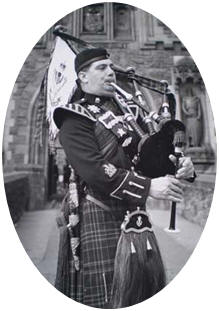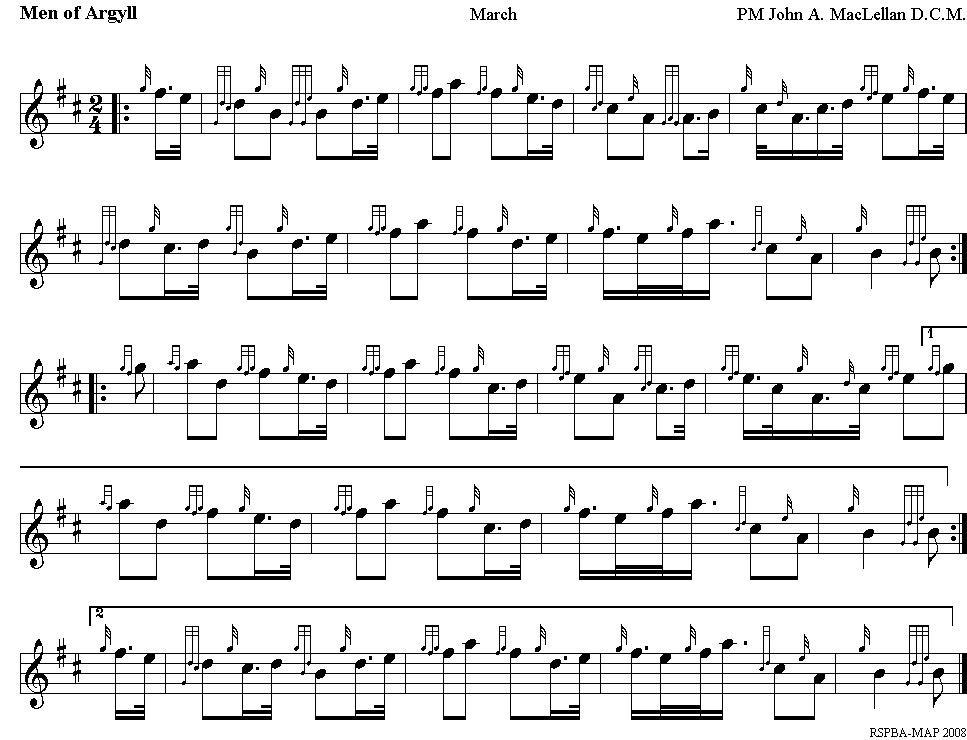Men of Argyle
was composed by Pipe
Major John McLellan DCM
(a title he earned
during a battle of
Magersfontein where he
rallied troops by
playing even after being
wounded in the ankle and
would later write a
retreat march inspired
by this event). It is
said that the
inspiration for this
tune may have come from
McLellan's time spent
along the secluded
shores of Loch Loskin,
located on Dunloskin
Farm -- just a short
walk's north-west of
Dunoon's town center and
the Cowan Game's Park.
McLellan also penned a
tune called Dunloskin
and both tunes were
originally published in
the now out of print
Cowal Collection.
As a piper, his
bright, clear tone
and playing were
riveting. As a
competitor he was
formidable. As a
teacher he was
forthright,
perceptive and
eloquent. And as a
leader of men he was
revered, feared and
unquestioned. It
would take a man of
just that stature
and piping strength
to step into the
shoes of the
legendary Willie
Ross as head of the
Army School of
Piping at Edinburgh
Castle.
John A. MacLellan was
born in Dunfermline,
Fife, in July, 1921. He
attended Fort Augustus
Abbey School and joined
the Queen’s Own Cameron
Highlanders as a boy
piper in 1936. His
potential became
apparent quickly, and in
1941 at age 19 he was
named Pipe Major of
the 9th Battalion,
Queen’s Own Highlanders:
the youngest man ever
named pipe major in the
British Army to that
point.
He would
subsequently serve
as pipe major with
the 1st Seaforth
Highlanders, the
Lowland Brigade, and
the 11th Seaforths.
He was promoted to
Warrant Officer 1
with his appointment
in 1954 as RSM of
the 1st and 11th
Seaforths and served
in Germany, Egypt,
and Gibraltar.
In 1946 he attended
the Pipe Major’s
course under Willie
Ross and graduated
with a Distinguished
Certificate. He
would later be sent
for piobaireachd
instruction to John
MacDonald of
Inverness, then the
Piobaireachd
Society’s official
instructor.
Prizes began to fall
to him immediately
after the war, when
he won the marches
at the Argyllshire
Gathering in 1947
and the Former
Winners’ MSR the
following year. He
won the Gold Medal
at Oban in 1957 (“In
Praise of Morag”) ,
the Gold Medal at
Inverness in 1959
(“MacLeod of
Raasay’s Salute”) ,
the Open
Piobaireachd at Oban
in 1948 (“The
Vaunting”) , and
1958 (“The Lament
for Colin Roy
MacKenzie”), the
Clasp at Inverness
in 1958 (“The
Daughter’s Lament”)
and 1963 (“The
Salute on the Birth
of Rory Mor
MacLeod”), as well
as the Former
Winners' March,
Strathspey and Reel
at Oban (1948, 1958,
1963, 1964) and at
Inverness (1948,
1958. 1963). The
Scottish Piping
Society of London
also felt his
competing prowess as
he won Bratach Gorm
there along
with five wins in
the Former Winners'
March, Strathspey
and Reel. By the
time he retired from
competing in 1968 he
had compiled one of
the most successful
competitive careers
on record. His most
notable competitive
achievement was to
win the four major
former winners’
events at Oban and
Inverness in 1958 –
a feat not
accomplished before
or since.
When he took
over from Willie
Ross in 1959, the
Army Piping Class
was being
restructured as the
Army School of
Piping. Over the
next 17 years he
would run a tight
ship at the Castle,
with a long line of
superb pipe major
candidates studying
under him. In 1963,
with much of his
best work still
ahead of him, he was
awarded the MBE for
his contribution to
the improvement of
Army piping. Five
years later he was
appointed to a
Commission in the
Queen’s Own
Highlanders,
becoming the first
Director of Army
Bagpipe Music.
As early as 1962
he had proposed
the idea of
amalgamating the
Army School, the
College of
Piping and the
Piobaireachd
Society under
one umbrella to
form the
Institute of
Piping. While
the actual
amalgamation did
not happen, the
Institute of
Piping was born
from this
ambitious
plan. The idea
and syllabus lay
dormant during
his lifetime but
has recently
been resurrected
and is becoming
a world standard
for classifying
piping levels.
Shortly
after
retiring
from
competition,
he was
offered
membership
in the
Piobaireachd
Society, and
this work
would form a
significant
part of his
piping
contribution
during the
rest of his
life. He
soon became
Honorary
Secretary of
the Music
Committee,
one of the
most
influential
and
important
appointments
in piping,
responsible
for all
aspects of
publication,
set tunes
and judging.
Those who
knew "Captain
John" during
his
retirement
remember him
for his
knowledge,
his
generosity
with it, and
his
beautifully
toned
instrument.
They find it
hard to
believe this
was the same
man feared
by his Army
subordinates
for so many
years.
John
MacLellan
died at
his home
in April
of 1991
at the
age of
70. His
son,
Colin
Roy
MacLellan,
continues
his
piping
tradition,
winning
many of
the same
prizes
John
won.
Colin
still
plays
his
father’s
MacDougall
bagpipe.



